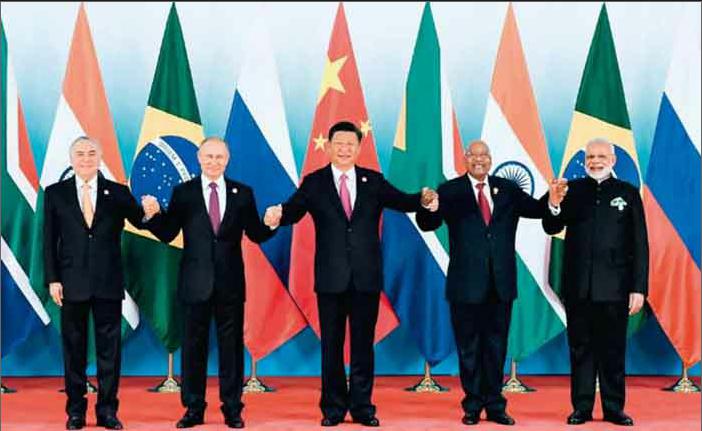A Golden Decade of Economic Cooperation
2017-09-27byWangLei
by+Wang+Lei



Over the past decade, as a representative of emerg- ing economies and developing countries, BRICS has launched a new global partnership for development, intensified cooperation between developing nations, promoted a more open, inclusive, balanced, mutually-beneficial and sustainable international economic system, and opened a new path for SouthSouth cooperation. Data show that economic cooperation within BRICS created a “golden decade” in terms of pragmatic financial, economic and trade cooperation and construction of an economic cooperation mechanism.
2017 embraces the second “golden decade” of BRICS cooperation. Looking into the future, BRICS countries foresee a bright prospect for their economic development; and they will make greater contributions to world economic growth and accelerating the reform of the global economic and financial system.
Economic Cooperation in the “New Normal” Era
In recent years, BRICS countries have entered a new stage of economic development: a new normal featuring deeper, broader economic cooperation due to the global economic situation, which has become increasingly complex.
First, the external environment of BRICS economic cooperation is more complex and fluid, which poses a great challenge for BRICS economic cooperation. During its early stages of cooperation, BRICS was plagued by the global financial crisis, but the member states stuck together to confront the challenge. Since the end of 2014, however, the weak recovery of the global economy has resulted in more prominent economic divisions between developed and developing countries, giving rise to trade protectionism, kindling greater political trade friction and marginalizing the multilateral trading systems, thus creating more challenge in building an open economic world in the face of anti-globalization and selective anti-globalization sentiments. BRICS countries have suffered an incomparably severe impact on trade and domestic development, which led to an economic downturn.
Second, China plays a leading role in BRICS economic cooperation and a variety of driving forces have gradually taken shape to back up BRICS economic cooperation. In 2016, Chinas GDP reached US$11 trillion, surpassing the total of that of the other four countries, and its average annual growth rate of some 7 percent was still outstanding. For a long time, Chinas trade with the other four countries accounted for 90 percent of the total trade volume among BRICS. China has remained the largest trading partner of Brazil, Russia and South Africa as well as one of Indias major trade partners.endprint

Over the last few years, the driving forces of BRICS economic cooperation have gradually become more diversified, which has significantly accelerated the establishment of a more balanced, inclusive BRICS economic partnership that will ensure healthier, more sustainable development in BRICS countries.
BRICS economic cooperation has entered an era of new normal, inseparable from the global political and economic situation. The current situation is also an outcome of BRICS initiative macroeconomic control and enhancement of common development.
As the international situation continues to undergo profound changes, the growing pains of instability and uncertainty are causing regional conflicts one after another as well as complicated and grim cases of terrorism, all of which have led to sluggish global market demand. Global trade is hovering at low rates and the international financial market has been volatile. BRICS countries could hardly avoid being dragged down by the world economy as it slowly recovers towards more sustainable operation.
After 10 years of rapid growth, BRICS countries have encountered problems, both socially and economically. All of the member states are experiencing an economic downturn that is considered the cost of reform during economic policy adjustment and economic transformation and upgrading by seizing opportunities for macroeconomic control.
China has the initiative to adjust and adapt to the economic growth pace of the new normal. The Brazilian government is also working on overall economic reform covering social security, infrastructural construction and state-owned enterprises. The government of India has actively deepened its reform in sectors like real estate, taxation and employment. South Africa has implemented radical economic reform measures.
Prospects for the Next Golden Decade
Looking into the future, the prospect for their economic development remains bright despite the fact that each of the five BRICS countries will face their own challenges.
First, we should fully and objectively look at the causes of BRICS recent relative slowdown in economic growth and be aware that the basic ingredients of rapid economic development of BRICS countries have not changed. Its energy resources remain strong, its indigenous power is sufficient, its industrial structure is becoming more rational, and its national economy and industrial system are increasingly ideal. This is different from what had happened during the global financial crisis: sluggish flow of finance, debt crises and lack of demand that developed economies were facing.endprint
Second, after initial adjustment and reform, the five countries are focusing on overcoming the difficulties they come across in economic development. They are trying to enhance their inner economic strength, underpin macroeconomic strategy with social policies, and thus enter a new period of development by turning quantity growth to quality improvement and through inclusive growth.
Third, BRICS countries have agreed on guided construction that allows more coordinated policies, intensified cooperation and capitalization on complementary strengths, creating enormous potential and space for cooperation and development as well as a louder voice in international economic and financial communities.
Economic Cooperation Will Remain the Focus in the Future
Economic cooperation is the eternal theme of promoting BRICS development and serves as a stabilizer for BRICS to expand cooperation. Embracing the next “golden decade,” BRICS economic cooperation will feature common development that is stronger, more inclusive, and more sustainable, across the following aspects:
First, strengthen global economic governance and work together to overcome challenges.
A. BRICS countries will make joint efforts to build an open world economy, firmly safeguard multilateral trading systems, continue to promote the Doha Round, oppose all forms of protectionism and exclusion, and ensure that all countries enjoy equal rights, equal opportunities and equal rules in development.
B. BRICS countries will continue to work together to improve the international monetary system, promote reform of Bretton Woods institutions and enhance the voice and representation of emerging markets and developing countries in global economic governance. Small states will play a great role in operation of the New Development Bank, support development efforts of BRICS and other emerging markets and developing countries and improve the operability of emergency reserve arrangements.
C. BRICS countries will strengthen coordination and cooperation in multilateral mechanisms. As the most important emerging economies, all members will strengthen communication and coordination in major international institutions such as the G20, the United Nations, World Bank, the IMF and the World Trade Organization, improve global economic governance, and promote international economic order that is fairer, more reasonable and more efficient.endprint
Second, promote shared development of BRICS members and other developing countries by intensifying economic cooperation among BRICS.
A. The BRICS economic partnership will be further strengthened. BRICS countries have an important position in the global economic landscape. The five countries have mapped out the Strategy for BRICS Economic Partnership (hereinafter referred to as the “Strategy”) in a bid to systematically plan intensified cooperation and create a massive market for trade investment. Against the backdrop of the complex world economic situation and the co-existence of opportunities and challenges in economic development, BRICS will implement the Strategy, draw a roadmap for long-term economic cooperation, strengthen macroeconomic policy coordination, take into account the respective development strategies of each of the five countries, and make joint endeavors to form a large integrated market, promote financial circulation, and achieve infrastructure connectivity.
B. As representatives of emerging economies, BRICS coun- tries will continue to promote international development cooperation, follow the principle of development, play a leading and exemplary role in implementing the sustainable development agenda 2030, provide more financial and technical support to developing countries and urge developed countries to keep their commitments, reinforce international cooperation in development, and help BRICS cooperation become the most important platform for boosting South-South cooperation.
This year marks the dawn of the second decade of BRICS cooperation. BRICS will continue to uphold the principles of “openness, inclusiveness, cooperation, and win-win results” as it builds a closer economic partnership, promotes implementation of the Strategy, furthers pragmatic cooperation in various fields, responds to global challenges, and creates the second “golden decade.”Obviously, it will play a larger role in promoting world economic growth, improving global economic governance and accelerating the common development of the whole world.endprint